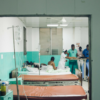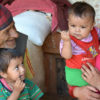
Costing for Improved Efficiency at the Justinien University Hospital in Haiti
Announcements, LeadsWritten by Sydney Taylor and Meredith Klein Dr. Jean Geto Dubé has faced his fair share of financial challenges as executive director of Justinien University Hospital (JUH) in Cap-Haïtien, Haiti. Standing before the hospital’s department heads in February, he provided a sort of State of the Union of the hospital’s finances. The situation was discouraging: […]





